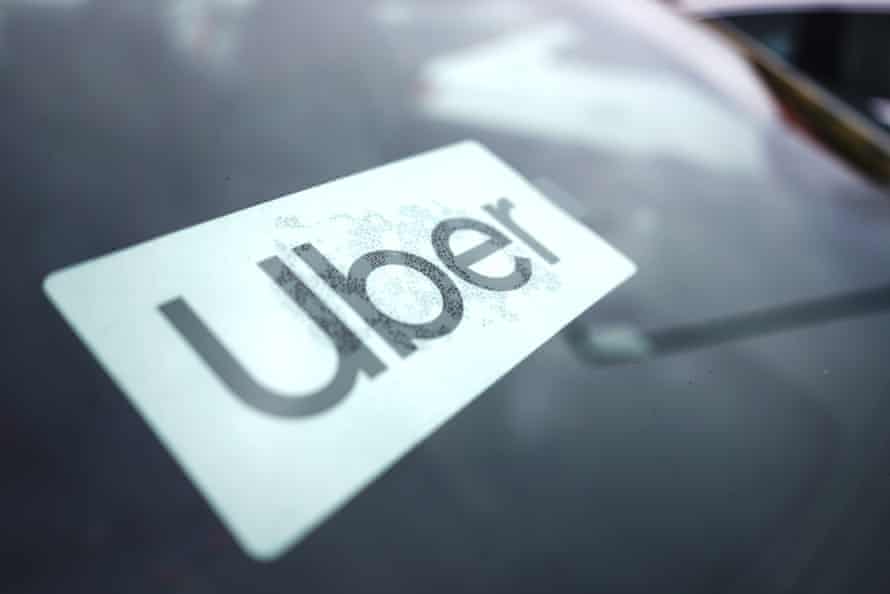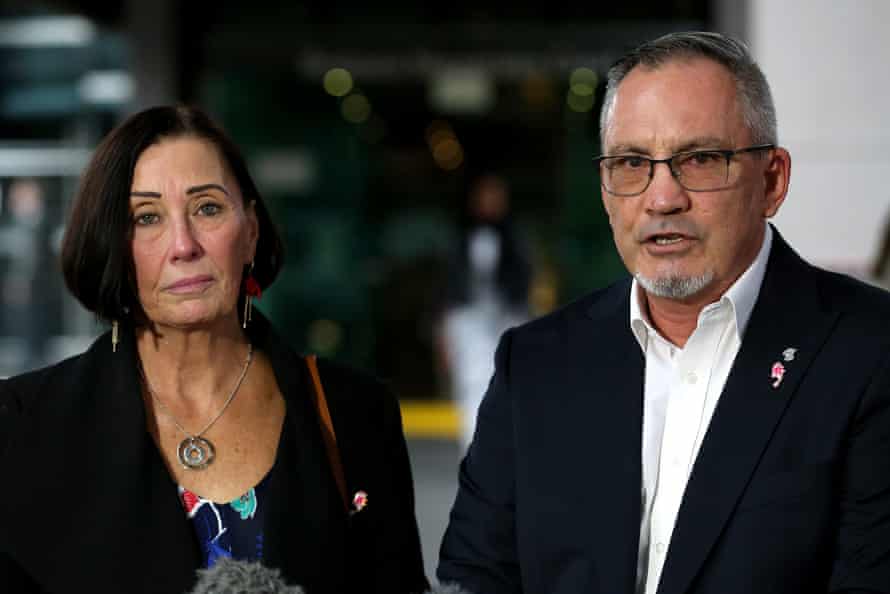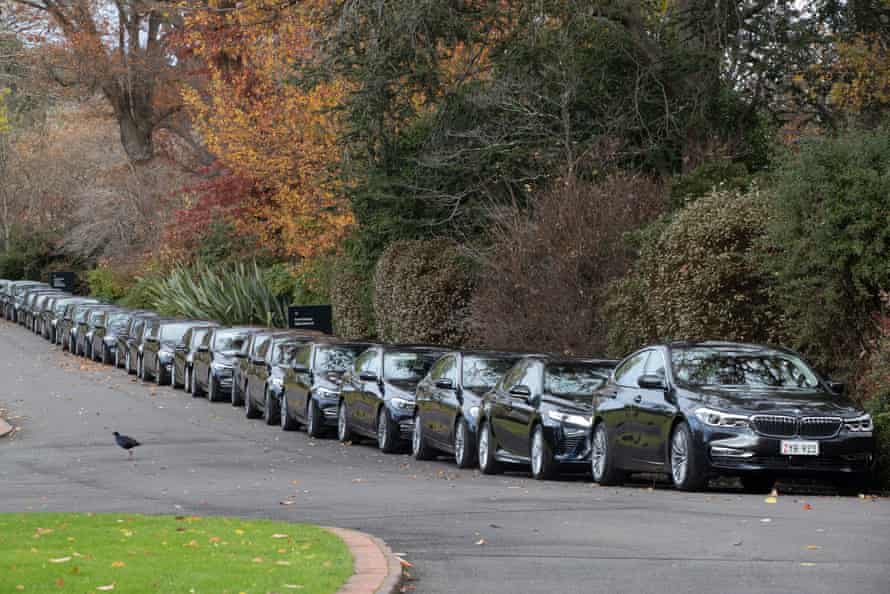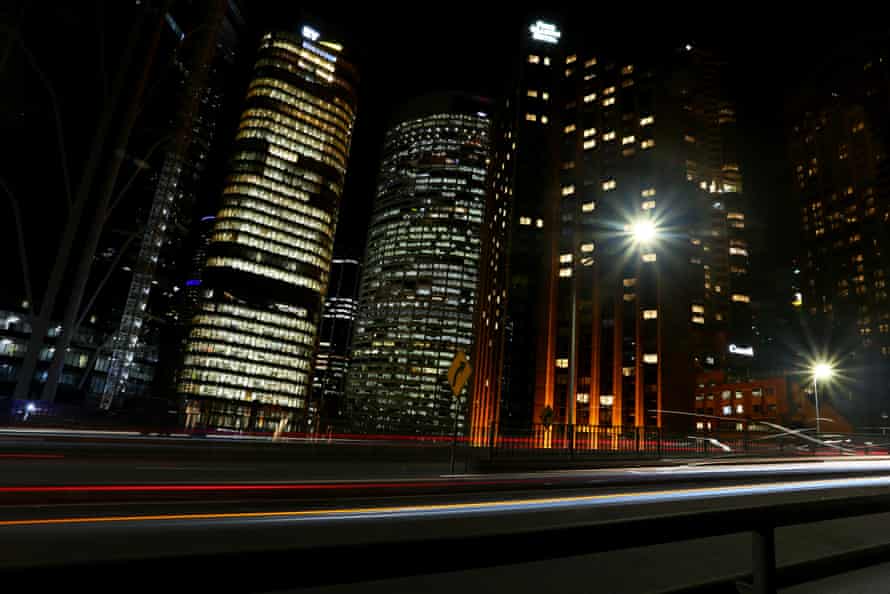
Albanese and Johnson meet at Nato summit
We just saw live images of prime minister Anthony Albanese meeting with his British counterpart Boris Johnson on the sidelines of the Nato summit in Madrid.
The pair shook hands and smiled as cameras snapped pictures of them in front of each countries flags.
As they sat down, Albanese pointed out that Australia has been the largest non-Nato contributor of aid to Ukraine.
That was about all we heard. We’ll have more from that meeting later.
Public servant first offered Barilaro’s New York job to give evidence at inquiry

Michael McGowan
Jenny West will be called to give evidence at the inquiry investigating the plum $500,000 New York trade job given to former New South Wales deputy premier John Barilaro.
A former public servant and businesswoman, West was originally offered the job in August of last year. She will be called to give evidence at the inquiry’s next hearing on 6 July.
At the first public hearing of the inquiry on Wednesday, the CEO of the agency responsible for making the appointment, Amy Brown, revealed she had verbally offered West the position before being instructed to scrap the recruitment process.
The Guardian has previously revealed the offer took place. It has also previously been revealed that after her offer was rescinded, West wrote a detailed memo to the head of the Department of Premier and Cabinet, Michael Coutts-Trotter, raising concerns about the process.
Brown told the inquiry that she had been instructed to “unwind” the offer after a “government decision” to instead make the role a ministerial appointment.
She was informed of the decision by Barilaro’s office, who at the time was the minister responsible for overseeing the appointments.
Brown told the inquiry that West was “extremely upset” when she was told of the decision on 1 October last year.
A few days later, on 4 October, Barilaro announced he was resigning from parliament and the new minister, deputy Liberal party leader Stuart Ayres, decided not to go ahead with making the roles ministerial appointments.
When asked during the inquiry why she didn’t reoffer the job to West, Brown said that the situation had become “quite irreconcilable” because West was “very unhappy”.
Brown said:
The relationship declined quite quickly once she was informed that she may not be going to New York so by the end of the first process I’d formed the view there was no suitable candidate.”
Regulators to scrutinise impact of social media algorithms

Josh Taylor
The Australian regulators responsible for overseeing Facebook, Twitter, YouTube and other social media networks say they will be focusing in the next year on the impact of algorithms, and what the platforms are doing to protect consumer data and reduce harm.
The Australian Communications and Media Authority (Acma), the Australian Competition and Consumer Commission (ACCC), the eSafety commissioner, and the Office of the Australian Information Commissioner (OAIC) met on Tuesday to determine their focus for the next financial year.
They said improving transparency around how data is held, how users are protected from harm, and misinformation is a key focus.
The regulators also said they would examine the impact of algorithms in how they recommend what people see, how they profile people, how they work in moderation, and the promotion of disinformation or harmful content.
There will be workshops and stakeholder meetings held throughout the next year.
National Covid summary
Here are the latest coronavirus numbers from around Australia today, as the country records at least 59 deaths from Covid-19:
ACT
- Deaths: 0
- Cases: 1,458
- In hospital: 116 (with 1 person in ICU)
NSW
- Deaths: 11
- Cases: 11,067
- In hospital: 1,526 (with 40 people in ICU)
Northern Territory
- Deaths: 0
- Cases: 334
- In hospital: 20 (with 4 people in ICU)
Queensland
- Deaths: 20
- Cases: 5,366
- In hospital: 597 (with 11 people in ICU)
South Australia
- Deaths: 0
- Cases: 2,847
- In hospital: 235 (with 8 people in ICU)
Tasmania
- Deaths: 1
- Cases: 1,174
- In hospital: 38 (with 5 people in ICU)
Victoria
- Deaths: 23
- Cases: 10,777
- In hospital: 463 (with 25 people in ICU)
Western Australia
- Deaths: 4
- Cases: 5,921
- In hospital: 229 (with 14 people in ICU)
Victoria’s new planning minister, Lizzie Blandthorn, will make independent decisions despite a potential conflict of interest with her lobbyist brother, the state government says.
Blandthorn, who took over the planning portfolio this week as part of a cabinet reshuffle, is the sister of Hawker Britton director John-Paul Blandthorn.
Hawker Britton’s clients include construction company John Holland, which is tasked with building the West Gate Tunnel, as well as developers Mirvac and the Dennis Family Corporation, and Melbourne airport.
The planning minister has the power to make decisions around permits and land rezoning, but the state government said arrangements would be in place to ensure any potential or perceived conflicts of interest were managed.
A government spokesperson said:
All ministers are expected to act with integrity as they manage their portfolios to deliver the best outcomes for Victorians.
The secretary of the Department of Premier and Cabinet, the secretary of the Department of Environment, Land, Water and Planning, and the Victorian Public Sector Commissioner are developing a robust management plan to ensure the independence of the minister for planning’s decision-making process.”
Blandthorn referred to the government’s written response when comment was sought from AAP.
Read more:
Morrison government ‘couldn’t be bothered to act’ on gig economy regulation, Tony Burke says
The Albanese government has congratulated ride-sharing giant Uber and the Transport Workers’ Union for striking a landmark agreement on proposed employment standards and benefits.
Tony Burke, minister for employment and workplace relations, issued the congratulations for the “significant deal that recognises gig workers need more rights” as his government plans to legislate to give the Fair Work Commission new powers to set minimum standards for gig workers.

Burke accused the previous Morrison government of saying regulating the gig economy was “too complicated”, and said the agreement struck by Uber and the TWU “shows that’s not the case at all” and that the Coalition “just couldn’t be bothered to act”.
Burke said:
We don’t want Australia to be the sort of country that allows workers to earn less than the minimum wage or be subjected to dangerous, unregulated conditions.
Australians want the flexibility and the convenience of the gig economy but they don’t want the people on the other end of the app getting ripped off or dying on our roads.
Without proper regulation, even if a platform tries to do the right thing by their workers – as Uber has today – the risk is they will be undercut by a rival that turns up on the market.
That’s why the government will extend the powers of the Fair Work Commission to be able to set minimum pay and standards for gig workers. It is the appropriate independent body to do this job. This will deliver a national approach that gives the commission the scope and flexibility it needs to deal with “employee-like” forms of work”.
You can read more about the landmark agreement here:

Christopher Knaus
The Human Rights Law Centre has warned that cuts to the staffing of crossbenchers will undermine their important role in dealing with whistleblowers.
Crossbenchers such as Andrew Wilkie have long had a role in interacting with whistleblowers and facilitating their disclosures using the powers of parliamentary privilege.
But the role is often complex, requiring a nuanced understanding of the Public Interest Disclosure Act and a weighing of the public interest.
Such considerations require resourcing and staff, according to HRLC senior lawyer Kieran Pender. He told Guardian Australia that this was under threat by the recent staffing cuts announced by Labor.
Politicians and their staff play a critical democratic function engaging with constituents who have concerns, including whistleblowers. There have been many notable examples of whistleblowers raising public interest concerns via parliament, particularly through independent and cross-bench politicians.
Last year, the House Privileges Committee emphatically confirmed the importance of this function to the democratic process and upheld the protection provided to whistleblowers by parliamentary privilege. Staffing cuts will make it harder for politicians to engage, support and empower Australian whistleblowers.
Coroner’s recommendations after Hannah Clarke inquest include training for specialist domestic violence police ‘as a matter of urgency’
Jane Bentley, the coroner investigating the deaths of Hannah Clarke and her children that we mentioned in the previous blog post, has made several recommendations as a result of the inquest.
Her recommendations included a five-day face-to-face training program for specialist domestic violence police officers “as a matter of urgency”, a mandatory face-to-face domestic violence module for all officers and state government funding provided urgently for men’s behaviour change programs in prisons and communities.
She also called for a multi-disciplinary specialist domestic violence police station to be trialled for a year. The station should include specialist officers including a detective, a support worker, a lawyer to advise police and victims, and representatives fro
Clarke’s parents said at the end of the “unthinkably confronting” hearing they hoped the inquest will help others avoid the same fate.
Lloyd Clarke, her father, said nothing would have stopped Baxter.
“He was just one of those people … so callous and used everyone as a pawn in his monstrous ways,” he said outside court.
He said his daughter and grandchildren’s murders, and the coronial inquest, had helped start an “uncomfortable conversation” on domestic violence and said it needed to keep going despite the end of the inquest.

Sue Clarke, her mother, added: “Every now and then I think a true monster is born and you can’t stop them.
“He [Baxter] underestimated how much a mother will fight and how strong a mother is. He didn’t love the children like she did. He had no idea what a mother will do.”
She called for the recommendations to be adopted across all Australian jurisdictions, not just Queensland.
Coroner says it was unlikely anyone could have stopped Rowan Baxter’s plan to kill Hannah Clarke and children
A coroner investigating the deaths of Hannah Clarke and her children recognised the mother’s “astounding” bravery, saying it was unlikely anyone could have stopped Rowan Baxter’s murderous plans.
AAP reports that coroner Jane Bentley’s voice broke as she finished handing her findings in a Southport court on Wednesday following a nine-day hearing in March.
Bentley said Baxter was not mentally ill, but a “master of manipulation”. “I find it unlikely that any further actions taken by police officers, service providers, friends or family members could have stopped Baxter from ultimately executing his murderous plans,” she added.
Clarke was leaving her parents’ home in Brisbane’s Camp Hill suburb to take Aaliyah, six, Laianah, four, and Trey, three, to school when estranged husband Baxter jumped into her vehicle on 19 February, 2020.
The 42-year-old splashed fuel inside the car and set it alight, before stabbing himself with a knife, dying nearby. The children’s bodies were found in the vehicle, while Clarke, 31, died the same day in hospital.
The inquest was shown CCTV footage of Baxter buying zip ties, cleaning fluid and a fuel can days before the killings. He also bought three Kinder Surprise chocolates – presumably for his children – when he purchased fuel.
Counsel assisting the coroner Jacoba Brasch QC told the hearing Baxter may have initially intended to kidnap Clarke, burn her, then give his children chocolates and it “would all be happy families”.
But he turned to “plan B” once the 31-year-old defied him by asking a bystander for help when Baxter ambushed her, she said.

Michael McGowan
Candidate for John Barilaro’s NY role had offer retracted after ‘government decision’, inquiry told
Businesswoman Jenny West was given a “verbal offer” for a New York-based trade commissioner job, but the head of Investment New South Wales, Amy Brown, was told to “unwind” the process after an instruction from the office of the then deputy premier John Barilaro.
In an explosive hearing of an upper house inquiry investigating how Barilaro was eventually offered the $500,000-a-year role, Brown, a senior public servant responsible for filling the role, revealed West was told she had got the job in August last year.
The government, including the premier, Dominic Perrottet, has previously insisted that no suitable candidate was found during the first recruitment process, but during the hearing Brown described her as an “excellent candidate”.
Read more from the inquiry:
‘The message is we’re back’ in fight against climate crisis, Chris Bowen says
Chris Bowen will travel to Egypt for the next United Nations climate summit in November, and said he plans to let world powers know the new Australian government “is back at the table”.
Bowen, the climate change and energy minister, said:
We’ll be going and the message is we’re back. Australia is back at the table as a world leader. That’s the message I’ll be taking to Egypt.
And this COP. As I said before, if my conversations in the early stages are anything to go by, the response from our partners will be very warm and strong. It has been from John Kerry, from Jennifer Granholm, Alok Sharma. I know the prime minister has felt the same in his conversations with world leaders. I expect that to be reflected in Egypt.
Commonwealth fleet EVs would move into secondhand market after turnover, Bowen says
Climate change and energy minister, Chris Bowen, is taking questions from journalists after his National Press Club address.
Asked how government policies will increase electric vehicle uptake in line with Labor’s projection, Bowen gives the example of taking the commonwealth car fleet to be 75% no emissions. He notes this fleet is about 10,000 cars, and has a flow-on effect in the market.
He said:
The commonwealth turns over its cars every three years. That leads into the secondhand market. At the moment you can’t buy a secondhand electric car in Australia. As we all know, if you want an affordable car, it’s most certainly a secondhand car. If you’re at a place in the market as many young people, buying their first car, they would love an EV.

And with that, I will hand the blog over to Elias Visontay for the rest of the day, thanks for reading.
Chris Bowen says avoiding blackouts ‘was no easy thing’ during worst of energy crisis
First up, a question on how close we got to blackouts during the height of the energy crisis. Bowen says:
Supply was tight. At several of the evening peaks, we would have gone through load shedding before we got to blackouts so – load shedding was a possibility we were preparing for. I’m confident that that would have avoided blackouts but I didn’t want to go down the load shedding line either.
And working together we managed to avoid that. No load shedding and no blackouts, and that’s a tribute to everybody involved, but it was no easy thing and, as I said, it shows the scale of the problem we’re dealing with. Far too many megawatts taken off with not enough megawatts brought on. That’s the problem, a deficit in energy generation as well as some market issues.
So, that was what we were facing. Now, in terms of your question about confidence, I’m very confident that all the people who work together to avoid load shedding and blackouts in the recent weeks will continue to do so.
As I have said, we run the risk of major unexpected outages, that’s a risk when you have a system that is under pressure, but any challenges we face, we will apply the same determination to put consumers first and ensure reliable energy supply in those difficult circumstances.

Australia’s new climate approach has been given “very warm” reception internationally, Chris Bowen says
Bowen has described the international climate emergency as a “jobs opportunity” for Australia:
We have already moved quickly to demonstrate to our international partners that we’re here to help and to lead. I have held, in the past and last month, discussions with the US secretary of energy, with President Biden’s special envoy for climate change as well as the COP26 president.
It’s fair to say that the reception to our government’s approach has been very warm. With a shared sense of excitement about the opportunities for strengthening the economic ties with these key partners in the global transformation under way, I’ll be continuing these conversations at the Sydney energy forum next month with visiting energy ministers from around the world.
The government will continue to support our partners in the region as they work to address climate change including with new financing arrangements.
Chris Bowen says national energy plan ‘the most dramatic economic transformation’ Australia has faced in modern era
Returning to Bowen, who has maintained his fiery pace during this address and is welcoming the integrated system plan (ISP) final document from Aemo, to be released tomorrow and outlining the future of the energy grid.
He then goes on to outline a national plan to cover all investments needed for renewable economy:
The plan is to cover what storage we need and where. It needs to cover what hydrogen we need and the pipelines we need to get it around the country. It needs to cover all the necessary investment. It needs to cover the enablers to the program like the upskilling of our workforce and making things in Australia.
I was delighted when the state and territory energy ministers, Labor, Liberal and Green, all represented around the table, unanimously agreed to work with me on that plan in our recent meeting. I described it as the ISP on steroids. The best time to second working on that plan was 10 years ago, and the second time is now. That’s what we’re doing.
This is the most dramatic economic transformation our nation has faced in the modern era and we have eight years, just over 90 months, to do it. That means we have to be all in.


